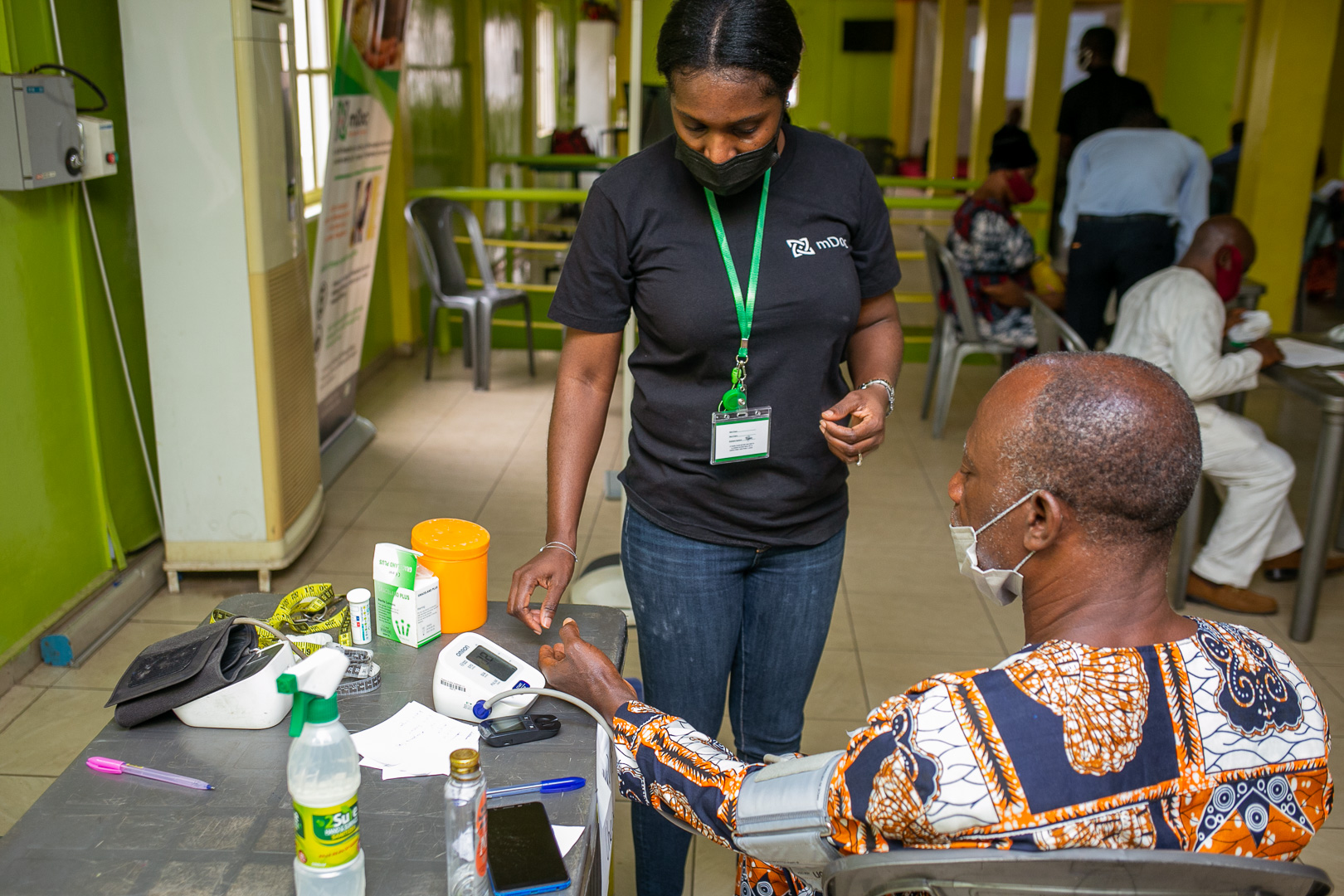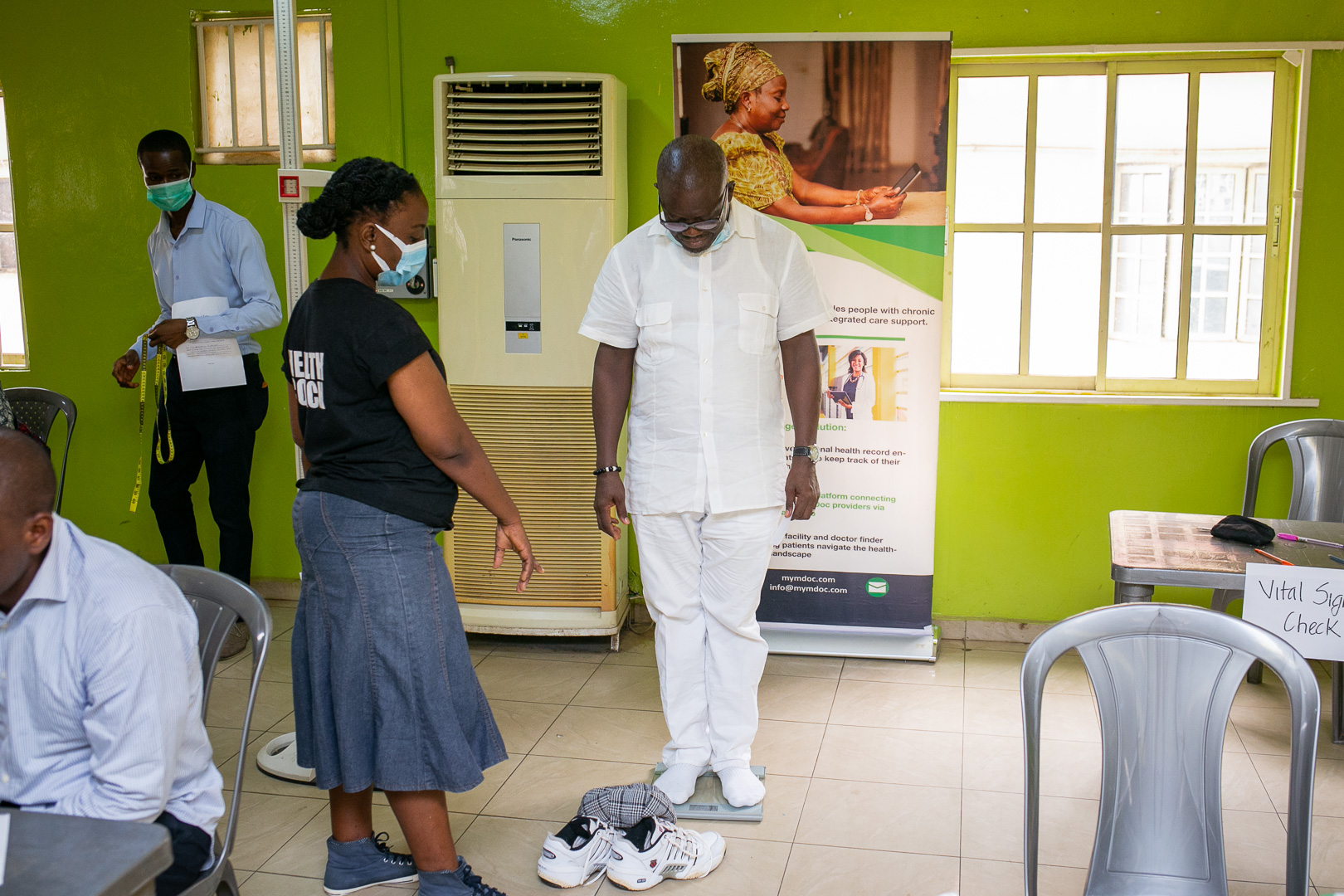
“We don’t use the word ‘pivot’ to describe what we’ve done to deal with COVID,” say L. Nneka Mobisson and Imo Etuk, co-founders of mDoc. A digital health company based in Nigeria, mDoc has “simply expanded the breadth and depth of [its] services.” Mobisson and Etuk almost downplay mDoc’s feats during the pandemic with their humble phrasing.
Founded four years ago, mDoc optimizes the end-to-end self-care experience for people living with regular and chronic health needs by harnessing quality improvement methodologies, behavioural science, data, and technology. The company offers a 4 component, high-tech, high-touch approach to integrated self-care. These are virtual coach-led and digital nudges through our CompleteHealth™ platform; in-person NudgeHubs to interface with members to provide integrated support and boost digital literacy; Tele-education classes (ECHO and TeNEC), that educate our members and healthcare providers on health-related issues and NaviHealth, a digital map to help users locate quality healthcare facilities in their community. Currently, mDoc serves over 30,000 members and makes it easier for them to live a healthier, happier life.
Members receive a regular suite of services and coaches through a tiered pricing strategy (and business clients, such as HMOs, pay a flat rate), but every client is given the same quality of care. “We’re a social impact organization, so we’re really trying to promote access for anyone,” says Dr. Mobisson. It was this commitment to expanding reliable and affordable health care to the poor and most vulnerable populations through public-private integration that earned mDoc one of USAID’s five Inclusive Health Access Prizes in September 2019.

In the intervening months, mDoc had been planning an expansion strategy to three other African countries, but the COVID-19 pandemic has demanded a deeper focus on their existing patients. In the early stages of the pandemic, mDoc provided anticipatory guidance, translating guidelines and information from other organizations into infographics or other easy-to-understand formats. “People didn’t really feel like it was a disease that would affect them at first,” according to Mobisson and Etuk, but they describe that “almost overnight, people became more anxious.” As the pandemic worsened, mDoc’s responsibilities multiplied. “We went from everyday lifestyle modifications and chronic care to managing cases like a 38-week pregnant woman who is bleeding and can’t find care,” say the company’s co-founders. “mDoc’s role is to supplement the existing health system,” they explain, and with an enormous strain on Nigeria’s healthcare infrastructure, the company’s role has become even more essential. “Facilities were shutting down or turning patients away because the staff members were getting nervous. We need to keep people out of the healthcare system if they don’t need to be in it, to help people get in control of their chronic diseases, to educate and increase awareness, and to help people navigate where to go for COVID or non-COVID related care.” mDoc’s members, those with chronic illnesses and pregnant women, are the very populations that are at greater risk of severe complications from COVID. The company’s response to the pandemic has proven their deep commitment to serving their client base: “We provide end-to-end care. We’re not just helping people find an isolation centre and leaving it there, but also helping them figure out how they will get oxygen and care.” In our effort to empower people with the education they need to prevent the likelihood of infection from COVID-19, we’ve created a knowledge bank of infographics.
mDoc has leveraged both its virtual and in-person platforms to expand their offerings and serve the community on multiple fronts. The company has expanded its existing platform for virtual health classes to offer new and more frequent workshops on how to manage diabetes or hypertension in the context of COVID, or classes around prenatal and infant care. “We’ve seen over 200 people at these tele-education conferences, and speakers from all over the world are volunteering their time to help,” say Mobisson and Etuk. Based on the consistency and growth of these classes, mDoc has been identified as the first superhub in Africa for ECHO.
mDoc has also seen PPE shortages in Nigerian hospitals, which are now requiring patients to furnish PPE for doctors and nurses–although many patients cannot afford masks even for their own safety. In response, mDoc created a COVID-19 Mama Kit Delivery Campaign to ensure that mothers can receive proper delivery care while keeping all parties safe. This campaign organizes Mama Kits containing blankets, PPE for doctors and nurses, and masks and hand sanitizer for the mother, and distributes these kits to the three largest hospitals in Lagos.
mDoc has also leveraged its NaviHealth directory to ensure that information is flowing down from hospitals to community members. The company is layering information around isolation, testing, and treatment centers onto their existing map, letting patients know where and when certain health services are available, and what they should bring. mDoc has even reopened its largest NudgeHub at the strong request of community members who greatly rely on these facilities to access regular healthcare services. Still cautious, they have developed systems to minimize risk to members and coaches. “We’ve found that a lot of healthcare facilities are not offering blood pressure measurements or other operations that involve touch,” Mobisson explains, “so we’re providing those necessary services in a sanitary way.”

When asked about mDoc’s expanding scope of service provision in light of the pandemic, Mobisson and Etuk say, “We’re first and foremost here in service of our members. COVID is making this a life or death matter, so we don’t have a choice.” They tell the story of a coach who noticed that one of her members, a pregnant woman in her third trimester, had been feeling unwell and refused to go to a clinic out of fear of contracting COVID. The coach urged her to go to a pharmacy, where the pharmacist indicated she had stage 1 hypertension and encouraged her to go to a hospital, but she was turned away at the door. The coach urged her to both get prescribed blood pressure medication and go to a different hospital, but her husband refused to let her go to the hospital. The mDoc coach and OB/GYN on her team tried to convince him otherwise, but it took three phone calls and 48 hours before she was finally admitted to a healthcare facility. She had an emergency C-section and the baby was born with jaundice– the team then advocated for the infant’s care until both mother and child were released from the hospital seven days later. “Today, the father is still calling the coach and OB/GYN to thank them, because his wife wouldn’t be alive without them,” Mobisson says. “This is just one day-to-day example for us. We strive to provide this level of support consistently.”
Despite enormous challenges and pressures in providing supplemental services in an already fragile health system, mDoc’s unwavering commitment to service and end-to-end care has only solidified during the pandemic. Beyond their service offerings, mDoc teams are filled with passionate healthcare workers who deeply care about their members. “We are there for you, one hundred percent of the time. We are there to advocate for you from beginning to end.”
Services provided by mDoc during the peak of the pandemic were free. In its drive to provide quality and affordable healthcare to low and average-income earners, mDoc announced the introduction of a subscription plan. The plan gives members and other people who are yet to register on CompleteHealth™ digital platform a wide range of options to choose from based on their budget.
Speaking on the introduction of the subscription plan, Mobisson said, “Our members and people living with chronic and regular healthcare needs now have access to the most robust and comprehensive self-care plans for their health goals”.
For the past four years, mDoc has been committed to helping its members with reproductive health needs and people living with Non-Communicable Diseases (NCDs) – diabetes, hypertension, cardiovascular diseases, and cancers, live a healthier and happier life. The subscription plan, which is divided into four options (Bronze, Silver, Gold, and Gold Plus), gives members value for their money. The four options grant members access to consult with health coaches, get personalised action plan, join private coaching group, join virtual exercise classes, and consult with Self-Care specialists.

In a bid to widen its healthcare reach, mDoc serves is optimized through the augmentation of the CompleteHealth platform by prioritizing 3 areas based on members’ needs. These are areas are; USSD and Offline Capabilities, to reach the 21% of current users without smartphones; facilitate use with smartphone users that see data costs as a barrier, and enable mDoc to continue to expand its low-income customer base and Machine Learning to optimize efficiencies in the support provided to populations and to help achieve scale within the communities mDoc serves. This includes enhancing the conversational design and integrating with clinical content for a chatbot.
Our mission is to transform how African healthcare consumers receive the support they need to live longer, healthier, happier, and more productive lives, while our vision is to ensure a healthier, happier, and productive Africa.
This article was originally published on Nigeria News


